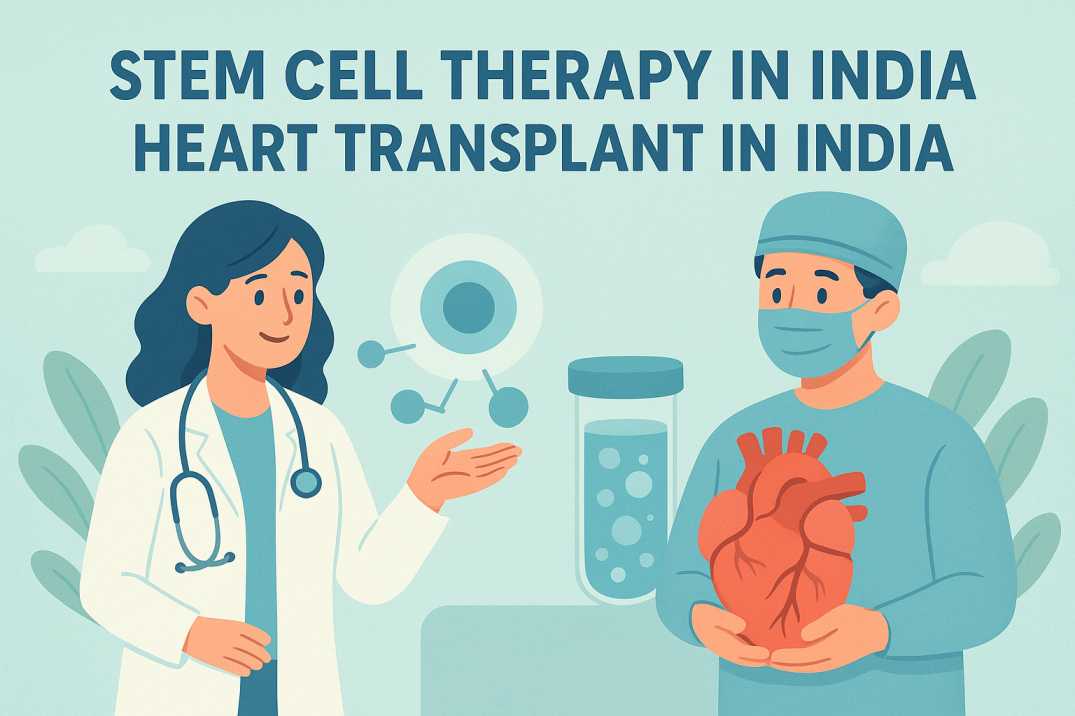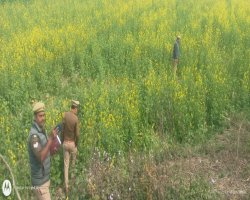Stem Cell Therapy in India | Heart Transplant in India

The Promise of Regenerative Medicine & Cardiac Care in India
In recent decades, India has emerged as a global destination for advanced medical treatments, particularly in regenerative therapies and organ transplantation. Among the most promising breakthroughs are Stem Cell Therapy in India and Heart Transplant in India, offering hope to patients with degenerative diseases and end-stage cardiac failure.
Stem cell interventions—ranging from autologous transplants to highly personalized regenerative protocols—are gradually bridging the gap between experimental science and clinical reality. Concurrently, India’s infrastructure for heart transplantation is evolving rapidly, backed by skilled surgeons and cutting-edge cardiac centers. Together, these modalities represent the frontier of modern medicine: regeneration, repair, and life extension.
In this article, we will explore how stem cell therapy and heart transplantation operate in India, what patients should know, where top centers are located, regulatory and ethical considerations, and what the future holds in these life-altering domains.
Understanding Stem Cells: Basics and Therapeutic Potential
To appreciate the role of regenerative medicine, it is essential to understand what stem cells are and why they matter. Stem cells are unspecialized biological cells capable of self-renewal and differentiation into multiple specialized cell types (e.g., muscle, nerve, bone). These properties make them uniquely suited for repairing tissue damage, promoting regeneration, and modulating tissue environments.
There are several types:
Autologous stem cells (derived from the patient’s own body, e.g. bone marrow, adipose tissue)
Allogeneic stem cells (from donor sources such as cord blood or umbilical tissue)
Induced pluripotent stem cells (iPSCs) — reprogrammed from adult cells
Mesenchymal stem cells (MSCs) — a common class used in regenerative studies
In India, research institutes like inStem (Institute for Stem Cell Science & Regenerative Medicine) lead efforts to create indigenous protocols and therapies for local populations. Meanwhile, numerous clinical centers and private labs are developing Stem Cell Research Lab For Personalized Therapy in India, customizing therapies based on patient biology and disease profiles.
Because stem cells can both replace damaged cells and secrete beneficial growth factors (paracrine effects), they hold therapeutic promise for neurological disorders, orthopaedic injury, cardiovascular disease, autoimmune conditions, and more. However, translation from bench to bedside remains gradual and careful.
Stem Cell Treatment
The field of Stem Cell Treatment represents one of the most revolutionary advances in modern medicine, offering new hope for patients suffering from chronic, degenerative, and otherwise untreatable diseases. This form of regenerative therapy harnesses the body’s own healing potential, using stem cells to repair, replace, or regenerate damaged tissues and organs.
What Is Stem Cell Treatment?
Stem cells are undifferentiated cells capable of transforming into various specialized cell types—muscle, bone, nerve, or blood. By introducing these potent cells into damaged areas, doctors can stimulate healing, reduce inflammation, and restore function.
Stem cell therapy has become a preferred option for treating conditions such as:
Neurological disorders like Parkinson’s disease and stroke
Orthopedic issues such as osteoarthritis and cartilage degeneration
Autoimmune diseases including lupus and multiple sclerosis
Cardiac diseases, especially post-heart attack recovery
Diabetes and chronic kidney diseases
How It Works
In a typical stem cell therapy procedure, cells are harvested from the patient’s bone marrow, adipose tissue, or umbilical cord blood. These cells are then processed in certified labs to ensure purity and concentration before being reintroduced into the patient’s body. The process triggers regeneration at the cellular level, leading to gradual recovery.
India’s Rising Role in Regenerative Medicine
India has emerged as a global hub for affordable and high-quality Stem Cell Therapy in India due to:
Advanced research facilities and internationally trained doctors
Significantly lower treatment costs compared to the West
Faster accessibility for both domestic and international patients
Government initiatives supporting medical tourism
Hospitals like AIIMS, Apollo, and Fortis, along with specialized centers such as Stem Cell Care India and NeuroGen BSI, are leading this movement with clinical-grade therapies.
The Future of Healing
The integration of stem cell research labs for personalized therapy in India is paving the way for treatments customized to individual genetics and immune responses. This will eventually improve patient outcomes, minimize risks, and redefine preventive healthcare.
HelloBiz and The Viral Lines continue to promote awareness of these advanced therapies, helping patients connect with ethical and certified medical professionals across India.
Advanced Stem Cell Therapy in India
Advanced Stem Cell Therapy in India combines modern biotechnology, cellular engineering, and precision medicine to provide safe and effective solutions for patients worldwide. With India’s medical tourism booming, thousands of patients from Europe, the Middle East, and Asia travel each year to access high-end regenerative treatments at affordable prices.
Why India Is Leading in Advanced Stem Cell Therapy
India’s leadership in stem cell science comes from:
Highly specialized hospitals: Apollo Hospitals, AIIMS Delhi, and Manipal Hospitals offer accredited programs with dedicated stem cell units.
Regulatory oversight: The Indian Council of Medical Research (ICMR) and CDSCO ensure compliance and safety protocols.
Research collaboration: Indian institutes like inStem (Bengaluru) and NCCS (Pune) partner globally for translational research.
Applications of Advanced Stem Cell Therapy
Neurological Regeneration: Treating paralysis, spinal cord injuries, and cerebral palsy
Cardiac Regeneration: Repairing tissues after myocardial infarction
Orthopedic Recovery: Healing osteoarthritis and tendon injuries
Autoimmune Modulation: Reducing immune system overreaction
Aesthetic & Anti-Aging: Skin rejuvenation and hair regrowth
Cost and Accessibility
One of the biggest advantages of seeking Stem Cell Treatment in India is cost efficiency. Treatments that cost $20,000–$30,000 in Western nations can often be performed in India for less than $7,000, without compromising safety or success rates.
Ethical and Safe Practices
Patients should always select centers operating under the ICMR guidelines and accredited by NABH or JCI. HelloBiz plays an essential role in helping patients identify verified clinics and doctors.
Conclusion
India’s advancements in regenerative medicine make it a preferred destination for global healthcare seekers. Advanced Stem Cell Therapy in India stands as a beacon of hope for millions suffering from degenerative diseases.
Best Doctor for Stem Cell Therapy in India
Finding the best doctor for stem cell therapy in India is crucial for successful treatment outcomes. India is home to some of the world’s most skilled and internationally recognized stem cell experts who blend medical expertise with compassion and innovation.
Top Specialists in the Field
Dr. Alok Sharma (NeuroGen Brain & Spine Institute, Mumbai) — Renowned for neurological stem cell research and over 12,000 successful cases.
Dr. Pradeep Mahajan (StemRx Bioscience, Navi Mumbai) — Expert in regenerative medicine for liver, kidney, and cardiac recovery.
Dr. Rajesh Sharma (AIIMS, Delhi) — Pioneer in hematopoietic stem cell transplants for blood disorders.
Dr. Sunita Agarwal (Bangalore) — Known for orthopedic and cosmetic stem cell applications.
Selecting the Right Specialist
Before proceeding, ensure the following:
The doctor practices at an ICMR-approved center.
The facility has GMP-certified labs for stem cell processing.
The doctor provides complete transparency regarding risks and outcomes.
Patient-Centric Care
Doctors collaborating with The Viral Lines and HelloBiz ensure personalized pre- and post-treatment consultation. These digital healthcare networks connect patients with verified regenerative experts across India.
Choosing the best doctor for stem cell therapy in India ensures not just treatment but long-term care, rehabilitation, and quality-of-life improvement.
Stem Cell Therapy Success Rate in India
The stem cell therapy success rate in India varies depending on disease type, treatment technique, and patient health condition. However, with improved technology and research, success rates have significantly increased.
Neurological conditions: 60–75% improvement in motor function and mobility
Orthopedic disorders: 70–80% improvement in pain reduction and flexibility
Autoimmune diseases: 50–70% symptom control with relapse prevention
Cardiac repair: Around 60% functional recovery post-therapy
According to multiple studies published on PubMed and NCBI, Indian stem cell centers show comparable outcomes to Western institutions, at a fraction of the cost. The growing demand for Stem Cell Care India has also pushed hospitals to improve transparency and follow evidence-based practices.
While the success rate can never be guaranteed, proper diagnosis, certified labs, and professional expertise greatly enhance the probability of positive outcomes. HelloBiz recommends consulting licensed facilities that publish their patient success data and follow ethical standards.
Stem Cell Treatments in India: An Ethnography of Regular Practice – Medical Anthropology
From a sociocultural lens, Stem Cell Treatments in India reflect not just medical progress but also the intersection of tradition, ethics, and modernity. The country’s unique position as a medical tourism destination creates a complex landscape that medical anthropology aims to understand.
The Social Dimensions of Stem Cell Therapy
Patients in India often view regenerative medicine as a bridge between science and hope. This perception is shaped by:
Cultural faith in holistic healing traditions
Increasing trust in biotechnology and precision medicine
Accessibility through medical travel and affordable pricing
Regulatory and Ethical Observations
Anthropological studies highlight that while Stem Cell Therapy in India has immense promise, ensuring regulatory discipline is key. The Indian Council of Medical Research (ICMR) emphasizes transparency, ethical consent, and the avoidance of commercial exploitation.
Global Perspective
International collaboration—between India, Europe, and the U.S.—in research and clinical trials demonstrates India’s rising credibility. However, the ethnography of practice reminds us that local narratives—hope, risk, and trust—must remain central to patient-doctor relationships.
Evolution of Stem Cell Research Lab for Personalized Therapy in India
India's journey in stem cell research began with foundational academic efforts, evolving into clinical and translational programs. Key themes in the evolution include:
Basic research foundations & state funding: Indian scientists have contributed to stem cell biology, regulatory science, and translational frameworks.
Pilot clinical trials & case studies: Several centers have run small-scale trials focusing on neurological disorders, orthopedic repair, autoimmune conditions, etc.
Private labs & commercialization: Labs offering autologous therapies, MSC infusions, and personalized protocols have emerged—some under the banner of Stem Cell Care India.
Regulatory developments: India has grappled with the balance of encouraging innovation and protecting patient safety. The governance around unproven stem cell therapies remains under refinement.
These developments have culminated in a landscape where some institutions are equipped with GMP-grade stem cell processing units, and personalized therapy based on patient biomarkers is becoming possible.
Leading Hospitals & Clinics for Stem Cell Therapy in India
When pursuing Stem Cell Treatment in India, patients have many options. Some of the prominent names include:
Stem Cell Cure Pvt. Ltd. (Delhi) — Renowned for blood disorders and degenerative disease protocols.
Stem Cell Care India — Offers therapies for MS, spinal cord injury, muscular dystrophy, and more.
MedAcess — A Mumbai-based center offering multi-disease therapy, often at relatively lower cost compared to international alternatives.
Chaitanya Stem Cell Center — One of the older regenerative centers combining holistic interventions.
Many top multispecialty hospitals (e.g. Tata Memorial, AIIMS, Apollo) host stem cell transplant units as part of hematology/oncology services.
These centers vary in their specialties (neurology, orthopaedics, hematology, cardiology), success rates, infrastructure, and pricing.
Stem Cell Treatment in India: Indications, Types & Processes
Indications & Applications
Stem cell therapy is being used or studied for:
Neurological disorders (spinal cord injury, stroke, cerebral palsy)
Orthopaedic repair (cartilage, bone defects)
Autoimmune and inflammatory conditions (MS, lupus)
Cardiac repair (post-MI, ischemic heart disease)
Hematological disorders (bone marrow transplants)
Types & Methodologies
Autologous bone marrow mononuclear cell grafting (common, safe)
Mesenchymal stem cell infusions
Exosome or secretome therapies
Cord blood / Wharton’s jelly–derived stem cell therapies
Procedure Workflow
Patient evaluation: Medical history, imaging, biomarkers
Harvesting: Bone marrow aspiration or adipose tissue harvest
Processing / isolation: In GMP / GLP certified lab
Quality checks and purification
Injection / infusion: Intravenous, local injection, intrathecal, or targeted delivery
Rehabilitation & monitoring
All along, the therapy is tailored to the patient, making the notion of a Stem Cell Research Lab For Personalized Therapy in India highly relevant.
Safety, Ethics & Regulatory Landscape of Stem Cell Therapy in India
While stem cell therapy is promising, it also raises significant risks and ethical concerns.
Unproven clinics & safety risks: Some clinics promote unverified “cures” without robust evidence. India has seen concerns regarding a regulatory vacuum in oversight.
Regulation by ICMR / CDSCO: The Indian Council of Medical Research and drug control agencies are working to regulate clinical deployment vs experimental usage.
Ethical consent & patient protection: Transparent informed consent processes are essential.
Long-term follow-up needs: Effects may evolve over years, including risks of tumorigenesis, immunogenic reactions, or failure.
Hence, any Stem Cell Therapy Hospital or Stem Cell Care India centre should operate under strict standards, publish outcome data, and avoid unverified claims.
Success Stories & Clinical Evidence for Stem Cell Therapy
Although many applications are still emerging, there are success stories and pilot studies:
Some stroke and spinal cord injury patients have shown improved motor function under controlled trials.
Autologous transfers in orthopedic/cartilage repair have yielded encouraging tissue regeneration.
Hematopoietic stem cell transplants (bone marrow) are well-established in India for leukemia, lymphoma, and other blood disorders.
However, robust randomized controlled trials are still limited. A cautious approach is necessary when interpreting anecdotal success.
Heart Transplant in India: Historical Milestones & Current Status
Parallel to regenerative therapies, heart transplantation is a mature surgical domain that saves lives in cases of end-stage heart failure.
The first successful heart transplant in India was performed by Dr. Panangipalli Venugopal at AIIMS in 1994.
Over the years, India’s volume has grown: from 53 heart transplants in 2014 to over 240 in 2018.
India ranks among leading countries for solid organ transplants in the WHO member states.
Many premier hospitals like Apollo Hospitals and Fortis have dedicated heart transplant programs.
Gleneagles Hospitals, MGM Healthcare, Kokilaben Hospital are listed among top heart transplant centers in India.
Despite growth, India’s heart transplant rate (~0.2 per million) still lags global norms (~1.06 pmp).
The Procedure, Eligibility & Post-Operative Care of Heart Transplant in India
Eligibility & Pre-Evaluation
Patients with end-stage heart failure not responsive to medical therapy may qualify. Evaluation includes:
Cardiac imaging, angiography
Pulmonary function, kidney/liver function
Immunological profiling
Psychological screening
Transplant Procedure
Donor heart procurement (brain-dead donors)
Cardiopulmonary bypass & explant
Implantation of donor heart
Revascularization, suturing, monitoring
The entire process requires a coordinated transplant team, cardiac anesthesiologists, ICU, and immunosuppressive management.
Post-Operative Care & Monitoring
Immunosuppressive therapy to prevent rejection
Monitoring for infection, graft dysfunction
Regular cardiac biopsies, imaging
Lifestyle modifications and rehabilitation
The lifespan and quality post-transplant depend on adherence to medication, early detection of complications, and long-term follow-up.
Cost, Challenges & Risks of Stem Cell Therapy and Heart Transplant in India
Cost
Stem Cell Therapy in India (autologous protocols) often ranges from USD 2,000 to USD 6,000 depending on disease and technique.
Heart Transplant in India typically costs between ₹20–35 lakhs (approx.) in private centers.
Thus, India presents a significantly cost-effective option compared to Western countries.
Challenges
Scarcity of donor hearts
Infrastructure gaps in smaller cities
Regulatory and oversight issues in stem cell domain
Post-operative complications (rejection, infection)
Long-term monitoring and access to immunosuppressants
Risks
For stem cell therapy: possibility of tumor formation, immune reactions, ineffective outcomes
For transplant: rejection, infection, surgical complications
Careful selection, transparency, and follow-up are essential to mitigate risks.
How to Choose the Right Hospital / Lab for Stem Cell or Transplant Care
When evaluating centers for Stem Cell Therapy Hospital or Heart Transplant in India, consider:
Accreditation (NABH, JCI)
Publications, documented outcomes
Experienced multidisciplinary teams
Regulatory compliance & ethical track record
Infrastructure (GMP labs, transplant ICU)
Patient testimonials & third-party reviews
Cost transparency and post-care support
Moreover, digital agencies like HelloBiz and The Viral Lines can assist in highlighting credible institutions online to ensure patients find authentic services.
Future Outlook: Regenerative Medicine, Transplants & India’s Role
Looking forward:
Stem cell research will progress toward more personalized, gene-integrated therapies
India has the potential to become a global hub for regenerative therapeutics
Integration of stem cell modalities with organ transplantation (e.g., pre-conditioning donor organs)
Better regulation, clinical trials, and patient registries
Greater public awareness and organ donation networks (e.g. MOHAN Foundation)
India stands at the cusp of uniting cutting-edge science with scalable healthcare models, potentially transforming lives across the globe.
FAQs about Stem Cell Therapy & Heart Transplant in India
Q1: Is stem cell therapy proven and safe in India?
Stem cell therapy has promising results, particularly in hematological transplants; but many regenerative uses remain in trial phases. Safety hinges on choosing regulated, credible centers.
Q2: Can stem cell therapy replace heart transplantation?
Not yet. For end-stage heart failure, transplantation remains the gold standard. Stem cell approaches for cardiac repair are still experimental.
Q3: How long is recovery after a heart transplant in India?
Typically, hospital stay lasts 1–2 weeks, with lifelong monitoring, medications, and periodic biopsies.
Q4: What is the survival rate post heart transplant in India?
Success rates vary; globally, 1-year survival often exceeds 85–90%. Indian centers report competitive outcomes, though long-term data continue to evolve.
Q5: How do I verify a legit stem cell therapy hospital?
Check for published data, accreditation, compliance certificates, peer review or clinical trial backing, and transparent informed consent processes.
Q6: What are the donor sources for heart transplants?
Primarily from brain-dead donors; live-donor heart donation is not practiced. Infrastructure and donation rates are key constraints.
Q7: Are there geographic hubs in India for these treatments?
Yes — cities like Delhi, Mumbai, Bangalore, Chennai host top stem cell labs and transplant centers such as Apollo, Fortis, AIIMS, Gleneagles, MGM etc.
In conclusion, Stem Cell Therapy in India and Heart Transplant in India represent two distinct yet complementary frontiers in regenerative health care. While stem cell therapies are pushing the boundaries of healing and tissue regeneration, heart transplantation remains the definitive life-saving option for end-stage cardiac disease.
Indian medical infrastructure, skilled professionals, and relatively lower treatment costs make India a compelling destination for patients worldwide. Yet, success depends on making informed choices and selecting institutions that emphasize safety, ethics, and transparency.
If you or a loved one is considering these advanced treatments, reach out to credible providers, review their outcomes thoroughly, and engage with reliable institutions. You can also leverage platforms such as HelloBiz and The Viral Lines to research, compare, and validate the best centers.
Take action today: consult a qualified specialist, request outcome data, and choose a center that aligns with your health priorities. The future of healing is evolving—and India is at its forefront.
Powered by Froala Editor
You May Also Like

How to Get 4000 Watch Hours on YouTube in 2026

Get More LinkedIn Engagement & Likes in 2026

Instagram Premium Followers | 100% Real Indian Followers

नाबालिग से दुष्कर्म का प्रयास, ग्रामीणों ने पकड़ा आरोपी

How To Increase Reels Likes (Complete 2026 Guide)

